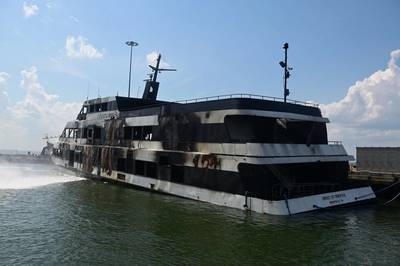NTSB Urges USCG to Remove Subchapter K Exemptions for Fire Safety
The National Transportation Safety Board (NTSB) recommended Tuesday that engine-room fire detection and fixed fire extinguishing systems be installed in small passenger vessels previously exempted from U.S. Coast Guard regulations in Subchapter K.
The NTSB issued the recommendations after investigating an engine room fire aboard the Spirit of Norfolk during a sightseeing cruise near Naval Station Norfolk, Viriginia, on June 7, 2022, with 108 people on board. The fire was too large for the crew to fight, and the passengers and crew were evacuated to other vessels. It then took firefighters four days to extinguish the blaze. No injuries were reported. The vessel was declared a total loss of $5 million.
For more than 20 years, the NTSB has been concerned with the increased risk of engine room fires and their ability to grow undetected on small passenger vessels. The NTSB first recommended requiring fire detection and fixed fire suppression systems in all small passenger vessels carrying more than 49 people to the Coast Guard in 2007 after investigating commuter ferry fires in 2000 and 2006. Current regulations exempt small passenger vessels regulated under Subchapter K that were operating before March 10, 1996, from certain construction, arrangement and installation requirements, including engine-room fire detection and fixed fire extinguishing systems. Subchapter K small passenger vessels are certified to carry more than 150 passengers or have overnight accommodations for more than 49 passengers.
“It is time for the U.S. Coast Guard to remove the exemption from the regulations,” said NTSB Chair Jennifer Homendy. “More than 100 of these exempted small passenger vessels are currently operating without fire detection or firefighting systems in their engine rooms while carrying hundreds of passengers—a completely unnecessary risk to passengers and crew. Vessels carrying a large number of people, no matter when they began operations, should be required to have fire detection and prevention systems so crews can take immediate action to protect and save lives.”
NTSB investigators determined the fire on the Spirit of Norfolk was likely caused by the ignition of combustible materials stored near the exhaust pipe of the operating port generator. As the vessel was in service before 1996, it was not required to have engine-room fire detection and fixed fire extinguishing systems. The lack of these systems allowed the fire to grow unnoticed and precluded crew firefighting efforts.
NTSB investigators also found ineffective communications between the unified command, formed to coordinate firefighting and response operations, and firefighting teams contributed to the severity of the fire on the Spirit of Norfolk. The unified command’s original plan to fight the fire was to place foam into the engine room through the emergency hatch on the main deck. The firefighting teams were not able to locate the hatch and did not communicate that to the unified command nor did the unified command monitor the teams’ efforts to locate the hatch. Instead of using the hatch, the fire attack team opened the engine room door, which allowed the fire to spread.
City Cruises, operator of the Spirit of Norfolk and other sightseeing vessels, told the NTSB they have committed to a multi-year project to retrofit their vessels with fixed fire extinguishing and fire detection systems.













